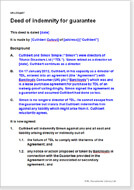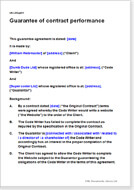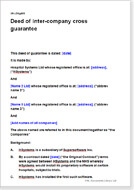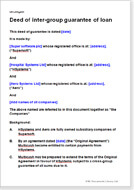Guarantees and indemnities
Businesses and individuals need indemnities and guarantees every day. Although agreements to add these to an existing contract are often regarded as difficult legal documents, the Net Lawman documents are as simple to understand as they are effective in law. These documents can be used to add a guarantee or indemnity for anything to any contract, from a loan agreement to a business sale agreement.
Deed of indemnity for guarantee
Professionally drawn, very short agreement to enable a guarantor to impose a legal obligation on the person he has guaranteed, to repay him if the guarantee is called.
Guarantee of contract performance
Simple agreement where guarantor steps in to guarantee performance of any contract. Example contractor has problems; other party refuses payment or threatens to sue. Guarantor "rescues" first party by guaranteeing performance of the contract. Original contract is referenced, so remains unchanged. Applicable to any situation. Very easy way to record re-arrangement of a deal.
Guarantee of contract debt OR Deed of guarantee of loan
Simple agreement where guarantor steps into guarantee payment of a debt. One party has money problems. The other party refuses credit or refuses to continue his own contractual obligations. Guarantor "rescues" the first party by guaranteeing payment. Applicable to any situation where money is owed. Optional new terms suggested.
Deed of inter-company cross guarantee
Professionally drawn cross guarantee for use by a company which seeks extra security before entering into a contract with a counter party. You have arranged for some other company or individual to guarantee performance of the contract by your counter party. Use at commencement of a new original contract or supplemental to an existing one. Option for changes to terms of main agreement. Strong legal protection. Applicable to any situation.
Deed of inter-group guarantee of loan
Professionally drawn cross guarantee to benefit a lender or other counter party dealing with to one or more members of a group of companies (or associated individuals). Each member of the group guarantees one or more loans or contracts made by one or more of the others. Could be at start of a new original contract or supplemental to an existing one. Option for changes to terms of main agreement. Strong protection for lender / counter party. Applicable to any situation.
Personal guarantee of company debt
This personal guarantee is the equivalent of the "PG" your bank might ask you to sign when storm clouds gather around your company. It is for use in any situation requiring an individual to guarantee the debt of a company, but most usually when the guarantor is a director. Applicable to any situation where money is owed. Suitable for use by lender or guarantor as it provides a wide range of options to produce a final version with high or very high level of lender security.

If the document isn’t right for your circumstances for any reason, just tell us and we’ll refund you in full immediately.

We avoid legal terminology unless necessary. Plain English makes our documents easy to understand, easy to edit and more likely to be accepted.

You don’t need legal knowledge to use our documents. We explain what to edit and how in the guidance notes included at the end of the document.

Email us with questions about editing your document. Use our Lawyer Assist service if you’d like our legal team to check your document will do as you intend.

Our documents comply with the latest relevant law. Our lawyers regularly review how new law affects each document in our library.
Documents to provide additional security to an existing contract
The subject matter of these documents is of a legal-technical nature. For that reason, none of them contain the wide range of options you will find in most Net Lawman documents. They are best used by insertion of the facts only, as we guide in the extensive drafting notes provided with each document.
They can be used where one or more of the parties are outside of Australia.
Sign your agreement as a deed, or as an agreement under hand. Our guidance notes explain how to do both.
The difference between a guarantee and an indemnity
A guarantee is a promise by a third party to carry out the obligations of one of the parties to the contract should that party fail to do so.
Guarantors often are brought into a contract to give additional security on rent or loan payments, but a guarantor could be used for the performance of any terms.
For example, because the shareholders in a limited company have limited liability by definition, anyone contracting with a new company may well ask for the personal assurance in formal writing of a director.
An indemnity is similar to insurance. The indemnifier has an obligation only if a specified event actually happens.
An indemnifier compensates the party for lack of performance. For example, an inventor might say: “I will grant you a licence to make my product but if you allow anyone else to copy the design, you must indemnify me against both the revenue I could have earned by granting a licence and also the cost of going to court to claim.”
Agreeing to be a guarantor
If you agree to be a guarantor, you should always make absolutely sure that you will be able to perform the action you have guaranteed. If the guarantee is simply that rent payments are made, then of course it is simply a matter of calculating whether you would be able to pay.
However, be careful of guaranteeing something that might be challenging for anyone, such as to bring a new technology to market; or wide obligations, such as on all terms of a lease. If you are called upon to stand in for the original party, you may find yourself unable to fulfil your obligations, or you may find that you are asked to fulfil obligations you did not originally intend to cover.
We advise against being a guarantor unless you are sure you could perform the contract, and the contract is very specific.
The law relating to these documents
There is no modern statute law relating to guarantees and indemnities, although of course written agreement is always best as a matter of practice and for proof.
These documents are based on the common law of contract.
Enforcing the guarantee or indemnity
At its most simple, the damaged party will normally have to make a formal demand of the original performer before he can ask the guarantor to step in. Depending on the subject matter of the guarantee, he may even have to issue a claim to prove that the original performer cannot perform.
An indemnity however, allows the person indemnified to approach the indemnifier as soon as there is a loss.
However, despite possibly being less easy to enforce, a guarantee is usually a more powerful psychological incentive for the original performance of the contract. People dislike having to lose face to their guarantor.
Similarly, whether you have an indemnity or a guarantee, it will always be more effective against an individual than a company. By and large, people would rather avoid personal bankruptcy than avoid letting their company go down.
Thank you again.Great service
All rights reserved






